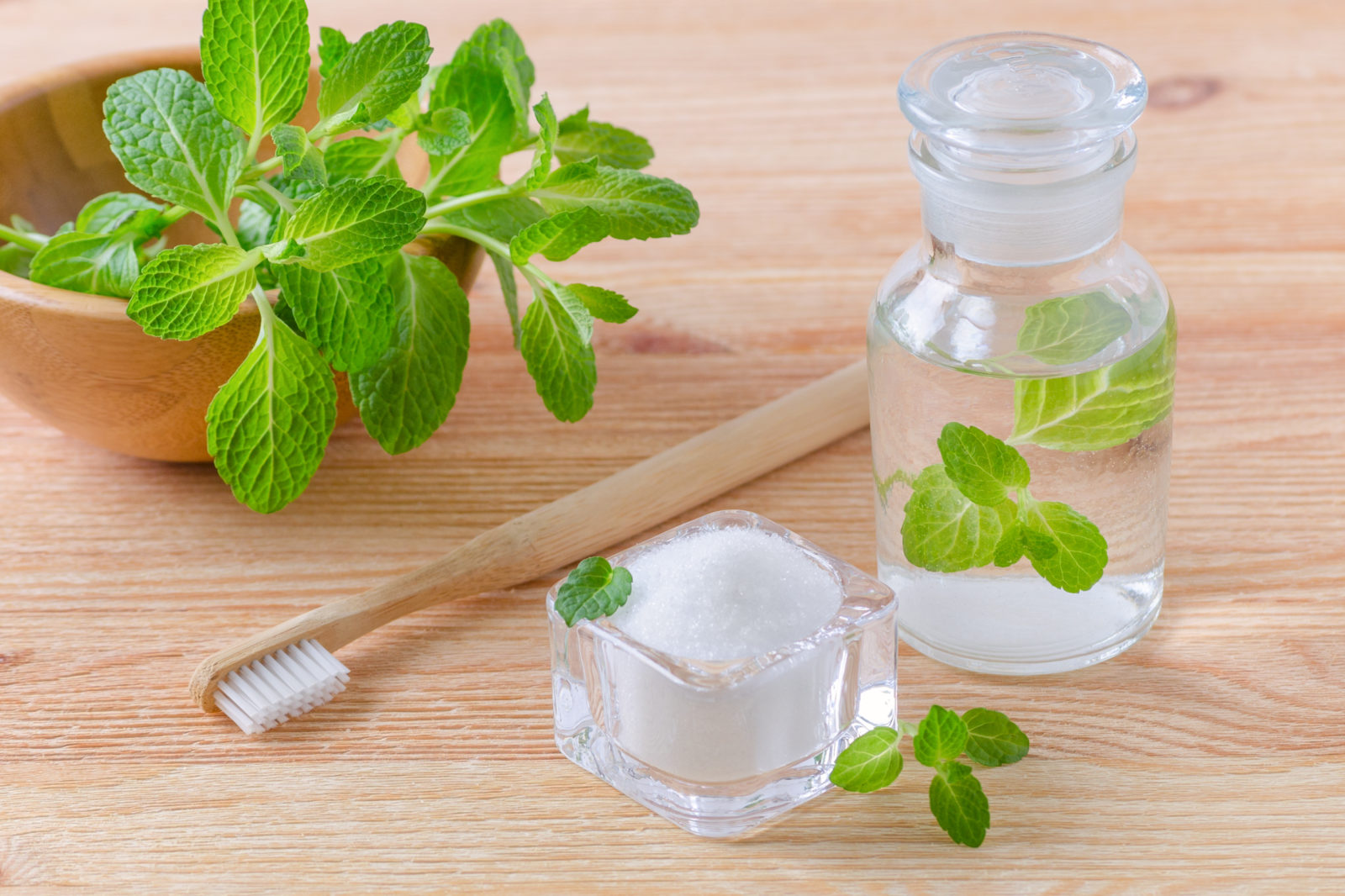Many mouth-rinses have within them pharmaceutical-grade amalgamated alcohol which is used as a tool to transport antimicrobial ingredients; alcohol supplies preservability, solubility, and germicidal activity. However, alcohol mouthwashes such as Listerine, Scope, etc. have been shown to possibly increase an individual’s chances of having oral cancer.
Listerine was first formulated as a surgical antiseptic (1879) and contains more essential oils than the stuff that makes up the stingy mouthwash today. It was sold as a great many other things, ranging from dandruff removal to floor wash to hand softener before it was sold as a mouthwash. Though it may aid in reducing the prevalence of gingivitis and plaque on teeth and gums the negative side effects of it cannot go unnoticed. It is very drying to the mouth, caused by the presence of both the alcohol and the “aroma”, better known as perfume. That’s right, its got perfume in it to make it more appealing to the senses. Perfume can be a neurotoxin, and if alcohol is added to Listerine to allow for better transport and uptake of antimicrobial agents, perfume is going to go along for the ride and enter your bloodstream. Furthermore, alcohol changes the pH of the mouth, which over time can lead to further tooth damage. The colorings added to Listerine, just as chemical color additives in foods can have numerous negative effects on the body. In children, it has been shown to display signs of aggression, mood changes, and difficulty in concentration. Instead of going for an alcohol-free mouthwash…which still holds all the unwanted chemical fillers make your own mouthwash at home. It is super easy and will leave your teeth clean without any negative side effects.
Minty Herbal Mouthwash
I really like St. Francis herb farm oils, however using any other oil brand is fine, just make sure that the herbs are of good quality and that they do not contain any unwanted fillers (for example glycerin).
Find a glass bottle, about a litter with a cap that can close the top.
Oils to use
Oil of Oregano
Tea tree oil
Peppermint
Thyme oil
Add three drops of each oil into the jar/bottle of filtered water and then you have all-natural mouthwash.
Oil of Oregano
Make sure that when choosing an oregano oil that comes from Mediterranean sources (wild is preferred) as due to its popularity many companies are now making it from thyme oil to meet demands (St. Francis uses wild-crafted Mediterranean sources). Used in the treatment of Candida and some intestinal and internal parasites, it is perfect at eradicating unwanted bacteria from inside the mouth. Good at combating gingivitis, reducing cavities, loosening up plaque buildup, etc.
Tea tree oil
When selecting a brand make sure the oil originates from Australia. Used to heal various skin and nail problems as well as vaginal infections. tea tree oil is a perfect addition to the clean mouth team. Its potency is fantastic in combating unwanted and harmful bacteria in the mouth.
Peppermint
If you have peppermint in your garden throw a few leaves with the stems in. A calming herb (carminative) when it comes to the colon, peppermint adds a nice taste to the otherwise SUPER STRONG and surprisingly SPICY mouthwash.
Thyme
A herbal disinfectant, it aids against bad breath, swollen tonsils, hoarseness, and a sore mouth (also provides that spicy kick).
References and Further Readings
Ahrens, W., Pohlabeln, H., Foraita, R., Nelis, M., Lagiou, P., Lagiou, A., . . . Brennan, P. (2014). oral health, dental care and mouthwash associated with upper aerodigestive tract cancer risk in Europe: The ARCAGE study. Oral Oncology, 50(6), 616-625.
Behind the label: Listerine teeth and gum defense. (2009, January 13). Retrieved from http://www.theecologist.org/green_green_living/behind_the_label/269558/behind_the_label_listerine_teeth_and_gum_defence.html
Fine, D. H. (2010). Listerine: past, present, and future – A test of thyme. Journal of Dentistry, 38.
Hoffmann, D. 1990. Holistic Herbal. A Safe and Practical Guide to Making and Using Herbal Remedies. London: Thorsons.
Tg, A. H. (2014). The Effect Of Listerine Mouthwash On Dental Plaque, Gingival Inflammation, And C – Reactive Protein (CRP). Dentistry, 04(02).
Tierra, M. (1998). The way of herbs: fully updated–with the latest developments in herbal science. New York: Pocket Books.
[inline-ad]Amanda Filipowicz is a certified nutritional practitioner (CNP) with a bachelor in environmental studies (BES) from York University. She also has certification in clinical detoxification, prenatal and postnatal care as well as nutrition for mental health. She has been working as a nutritionist since 2013 and is a lifelong proponent of eating healthy.

